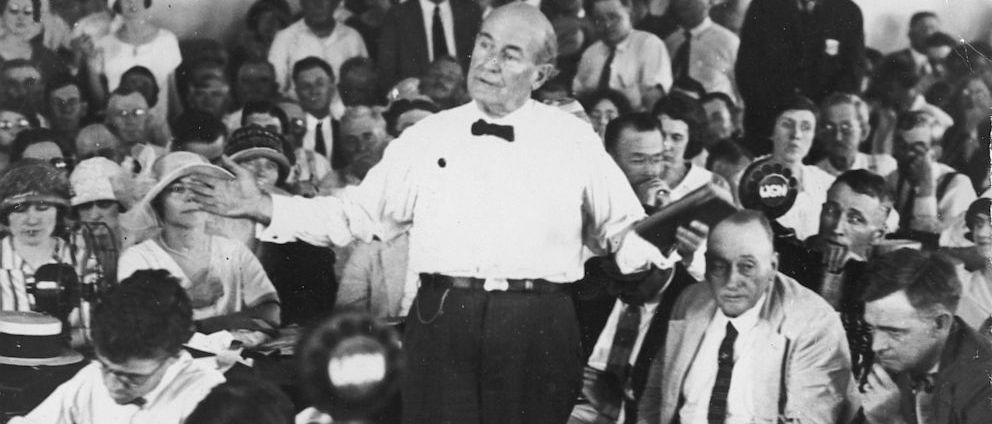Scopes Monkey Trial: Darwin in the Dock
Posted on 17th July 2021
It is an argument that simply won't go away, particularly in the United States of America - Creationism versus Evolution? On 18 June 1925 it was played out in a Courthouse in Tennessee in a trial that became a battle between religion and science and a struggle over two very different world views the traditional and the progressive. It transfixed the nation and the arguments fought over have continued to resound down the decades since.
Fundamentalist religious revivalism was in the ascendant in the United States following the conclusion of the Great War reaching its apex in the passing of the 18th Amendment, or Prohibition Act, that banned the production, transportation, sale, and consumption of alcohol. But this was not the end of the attempt at a moral cleansing however, and the education system remained a target for reform particularly its religious teaching.
Charles Darwin's, Theory of Evolution had been taught in biology classes since the turn of the century but there were those who believed that it was given too greater prominence and that it undermined the literal truth of the Bible.
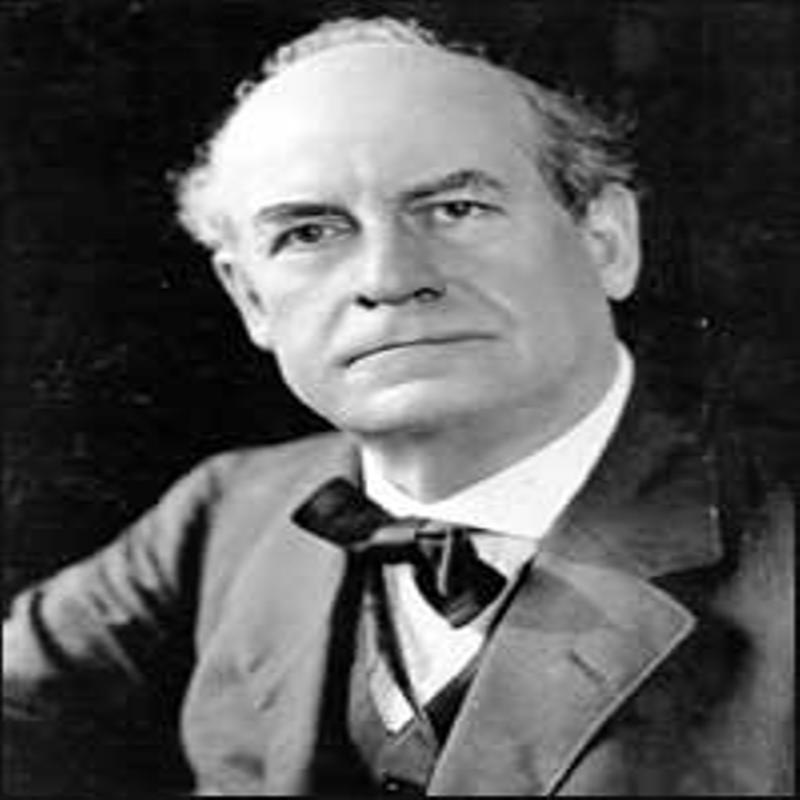
At the forefront of the campaign for a moral cleansing and a return to religious values was the populist three times Democratic Presidential Candidate, William Jennings Bryan. He was a noted Presbyterian firebrand and a brilliant orator who had come to national attention following his famous Cross of Gold speech at the Democratic National Convention on 9 July 1896, which he concluded with the words: "You shall not press down upon the brow of labour this crown of thorns. You shall not crucify man upon a Cross of Gold”.
His speech caused a sensation and has since become one of the most famous in the American political lexicon and it was to win him the nomination as the Democratic challenger for the highest position in the land. At the age of just 36 he remains the youngest ever Presidential Candidate for either of the major political parties.
Under his guidance the campaign to eradicate Darwin from the school curriculum soon became a crusade and by 1925, he'd already had it removed from the curriculum of 15 States.
In February the same year the State of Tennessee passed the Butler Act which made it illegal to: "Teach any theory that denies the story of Divine Creation as taught in the Bible and teach instead that man was descended from a lower form of animal”. The new law came into force on 21 March, and Tennessee became the first State to specifically outlaw the teaching of evolution. The following month the American Civil Liberties Union placed an advertisement in all Tennessee newspapers offering to defend any teacher in the State who was willing to challenge the Butler Act in a Court of Law.
It was an outsider from New York, George Rappleyea, who had lived in Dayton since 1922 who suggested that a teacher from the town should take up the A.C.L.U challenge and he had one in mind, his friend John Thomas Scopes.
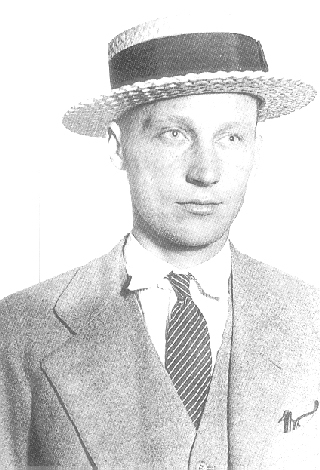
Scopes was an unassuming 24-year-old football coach of liberal views who though an advocate of Darwin’s Theory of Evolution rarely, if ever, taught it biology not being his subject. The Scopes Monkey Trial, as it was to become known, was unusual then in that it was deliberately contrived.
Local businessman in the small Tennessee town of Dayton worried that their municipality was dying, its population had almost halved in little more than a generation to barely 1,800, were desperate to revive its fortunes and so Rappleyea’s idea had great appeal and so at a meeting of civic dignitaries and local businessmen at Robinson’s Drug Store it was decided to test the validity of the Butler Act if Scopes was willing to be the defendant? A close friend of many of those present, he agreed.
They believed that the trial would create at least a local or State wide controversy and provide the town with some much needed publicity. It was in fact to put their little town on the map in ways that would have been previously unimaginable.
On 5 May, John T Scopes, who had previously been reprimanded for discussing Darwin in class, was arrested for teaching the theory of evolution from the approved school textbook, Hunter’s Civic Biology. Three weeks later he was charged with a breach of the Butler Act.
The case immediately caught the public’s attention and a Northern newspaper, The Baltimore Sun, posted bail and sent its top reporter H.L Mencken to cover the forthcoming trial.
When William Jennings Bryan was approached by the Fundamentalist Christian Association of America to take the case for the Prosecution, the businessmen had achieved a level of publicity beyond their wildest dreams.
The businessmen of Dayton originally approached the British science fiction author H.G Wells to head the Defence Team. It was a bizarre choice but one Wells declined in any case on the grounds that he had no legal training.

Instead, the Baltimore Sun paid for the legendary lawyer Clarence Darrow to take the case.
Darrow was a noted agnostic and a leading member of the American Civil Liberties Union who was against prohibition, opposed the death penalty, and supported the teaching of Darwin's Theory of Evolution in America's schools. Determined to defend freedom of thought and conscience against those he believed sought to confine knowledge within the parameters of their own understanding and world view he was delighted to take the case, seeing it as an opportunity to turn the trial into a point of Constitutional Law.
Bryan thought otherwise, he was frightened by the theory of evolution which he equated to Social Darwinism, the horrors of the First World War and the notion that one man could be by race and breeding made better than another. Darrow believed that without scientific investigation man would live forever in the Dark Ages, Bryan that denial of the Word of God would see man descend to the level of an animal.
Both William Jennings Bryan and Clarence Darrow were avid self-publicists, one the three times Presidential Candidate, the other America's most famous ever lawyer, and they had history.
Previously friends, Darrow had even campaigned for Bryan during his first run for the Presidency in 1896, they had since grown apart – Bryan now saw Darrow as the advocate of amorality, Darrow saw Bryan as a man of the past. Now destined to confront one another in a Court of Law it was to be a Clash of the Titans in both thought and deed, but also of ego.
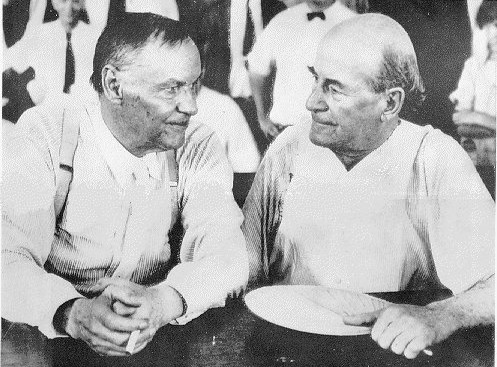
The trial was to be presided over by Justice Thomas P Raulston, a committed Christian who though by no means a fundamentalist often carried a Bible on his person. He was up for re-election the following year and so to preside over the trial of the century and one that matched Man against God in the heart of the Bible Belt was like manna from heaven, so much so that he convinced himself that he had been chosen by God to do so.
The trial began on 10 July 1925, amid a carnival atmosphere and more than a thousand people tried to pack into the small Rhea County Courthouse. In fact, it was to become so hot in the Courthouse that Justice Raulston was forced to abandon the proceedings and continue them in the grounds outside.
Bryan opened the case for the Prosecution by stating that if Evolution wins then Christianity dies.
Darrow responded by saying that it was not John T Scopes who was on trial but civilisation itself and that the Prosecution were opening the doors to a period of bigotry not seen since the Middle Ages. He asked: "Is the Bible to be the yardstick by which to measure man's intellect, to measure every man's intelligence, to measure every man's learning?”
These were just the opening salvoes of a case that was to divide America, a case that should in truth had been a simple one.
Had John T Scopes by his actions breached the Butler Act? Without question he had. But already the Trial was no longer about that.
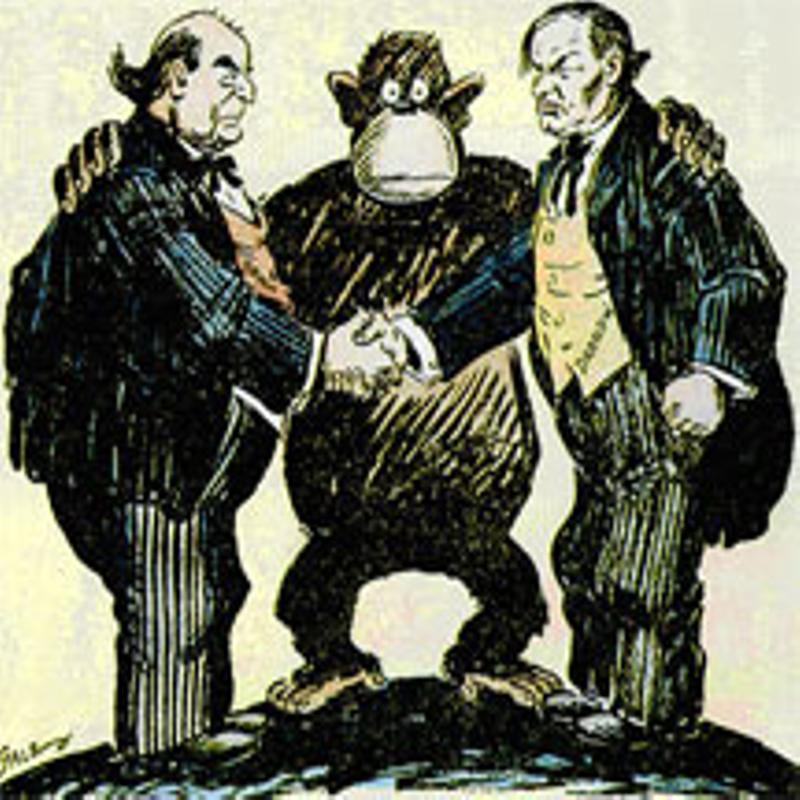
The 66-year-old Bryan and the 68-year-old Darrow were to lock horns in a philosophical debate in such an energetic display of bravura that it was to defy both their age and the inclement weather.
Bryan criticised the evolutionists for teaching children that humans were essentially no different to any other form of mammal and that they were created by God in his own image but were descended from monkeys, and not even American monkeys but Old-World monkeys. And so, the rhetoric went back and forth.
In the Courthouse itself the odds were stacked against Darrow but in the country at large Bryan's Fundamentalist Christianity saw the people of Dayton and indeed the entire South became objects of ridicule.
Bryan whose evangelical Christianity and populist brand of politics had always been opposed by the liberal press was lampooned as the “High-Priest of Mumbo-Jumbo”. Life Magazine reported that he had "successfully demonstrated by the alchemy of hot air that ignorance could be transmuted into gold." The press, particularly in the Northern States, had long been opposed to Bryan, the man who his admirers referred to as the Great Commoner but had according to H.L Mencken become the Fundamentalist Pope.
They saw in his literal interpretation of the Bible contrary to all the scientific evidence as little better than witchcraft. Here was the ideal opportunity to expose him as a peddler of untruths, a false idol.
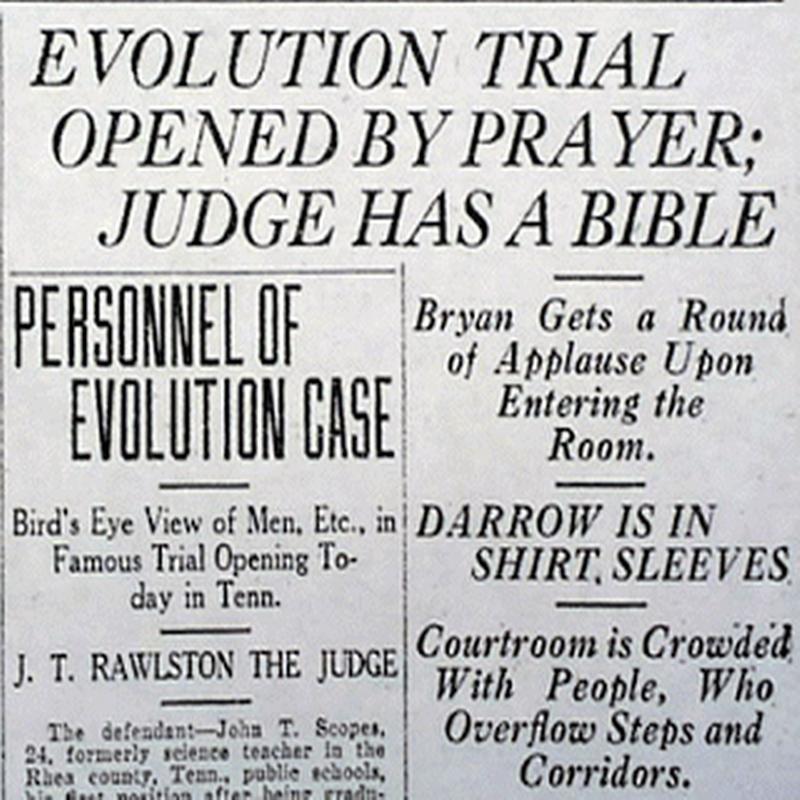
As the Trial wore on Darrow was became increasingly frustrated by the constant shouts of "God Bless, Bryan!" from the public gallery, and the insistence of the Judge that a prayer be said before the start of every day’s proceedings. But things were to get worse for Darrow on what was a torrid fifth day of the trial.
People had been waiting anxiously for Bryan to take up the cudgel and it was now he chose to do so. Evolution, he declared, removes God from the act of creation and turns man into just another animal, and that ideas without morality, the morality of the Bible, were dangerous. Then looking Darrow straight in the eye he remarked that hadn’t the Defence Counsel himself said as much in the case of Leopold and Loeb?
The previous year Darrow had defended two rich young New Yorker’s Nathan Leopold and Richard Loeb who had kidnapped and murdered a child simply for the thrill of it.
It had been a high-profile case the appalling nature of which should have ensured that the severest penalty was administered but despite the damning evidence against them Darrow had nonetheless saved them from the death penalty.
Darrow replied that he had said no such thing but Bryan was reading direct from the Court transcripts. In response Darrow borrowed the transcripts and quoted further his words from them: “You cannot destroy thought because some brain may be deranged by thought”.
But Bryan had won the day.
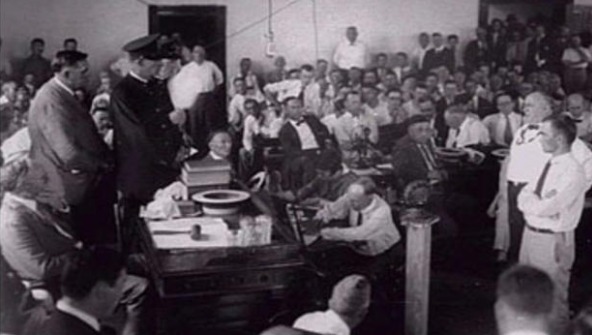
Darrow who had been busy gathering a number of eminent scientists and academics, some of whom were practising Christians and even lay preachers, to argue the case for evolution was to be frustrated once again by Justice Raulston. Though an admirer of Bryan he was keen to be seen as impartial but nonetheless ruled inadmissible Darrow’s expert witnesses on the grounds of irrelevancy. With his expert witnesses denied the opportunity to testify it seemed that Darrow’s case had collapsed and many of the journalists present now packed their bags and returned home.
But Darrow was far from finished and on the seventh day of the trial he took the unprecedented step of calling upon the Chief Prosecutor William Jennings Bryan to take the Stand. He wanted to question him upon the contents of the Bible, he said. Bryan was under no obligation to take the Stand, and he was advised not to do so by the rest of his Defence Team, but he relished the opportunity to defend the Holy Book against the secularists and before the world. So, he agreed, and Darrow at last had his expert witness.
Darrow was determined to show that the Bible was a book made up of stories and parables that were open to interpretation and could not be used as a basis for the teaching of science in schools. Reading directly from the Book of Genesis he put a series of questions to Bryan, who was often referred to by Darrow as an expert on the Bible, that he could not answer with any degree of certainty:
Was Jonah truly swallowed by a whale?
Was the world really created in six days?
What was the length of a day?
Did God really make Eve from Adam's Rib?
When he asked where did Cain's wife come from? Bryan replied too much laughter: “I will let the agnostics hunt for her.”
It was a rare moment of levity in what was becoming an increasingly heated and angry debate. In one particularly furious exchange Darrow declared that: “You insult every man of science and learning in the world with your foul religion.” To which Bryan retorted: “I want the Christian world to know that any atheists, agnostic, unbeliever, can question me as to my belief in God, and I will answer him.”
Darrow’s cross-examination of Bryan was harsh and brutal so much so that the Prosecution tried to intervene and get him to relent but he refused. Likewise, Bryan would not stand down. When one of the Prosecution Team demanded to know of Darrow what his real intentions were Bryan interjected to say that: “The only purpose Mr Darrow has is to sneer at and slur the Bible.” An offended Darrow snapped back: “It is not, I am examining your fool ideas that no intelligent Christian believes and mean to prevent bigots and ignoramuses from controlling the education system of the United States.”
After more than two hours of angry exchanges in stifling heat Justice Raulston adjourned the case.
It had been the most dramatic moment in a dramatic Trial during which Bryan's rambling and often incoherent answers to Darrow's line of questioning had made him look like a fool. Justice Raulston later ordered that his testimony be struck from the Court records.
The Southern press came to Bryan’s defence saying that Darrow’s questioning of him had been a cruel and unnecessary hounding of the witness. The Northern press gleefully declared that Darrow had “made a monkey of Bryan.”
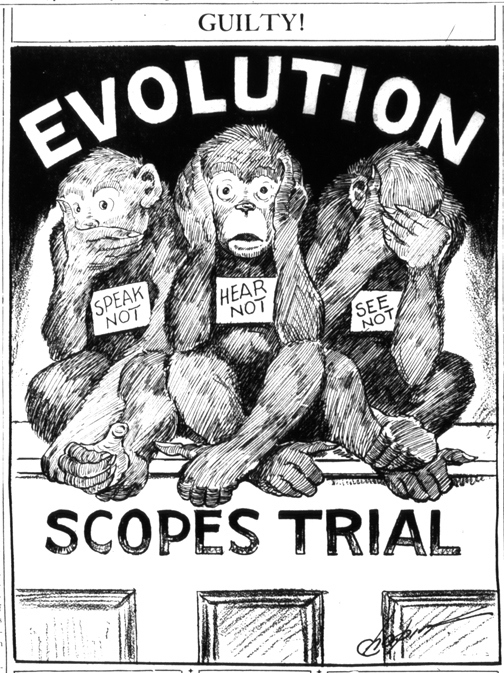
On 21 July, after just nine minutes deliberation, the Jury brought in a verdict of guilty.
John T Scopes was ordered to pay a $100 fine, which was the minimum permissible punishment. After the sentence he addressed the Court: “I feel I have been convicted of violating an unjust statute. I will continue in the future as I have done in the past, to oppose this law in any way I can.”
If the light sentence was intended to draw a line under the case it failed for Scopes had no intention of paying the fine. Darrow, who still determined to make the case a constitutional issue, was delighted at Scopes defiance. They would appeal the sentence. Bryan was furious and demanded at the very least a custodial sentence for the arrogant Scopes.
But Darrow still had one more trick up his sleeve.
He was aware that Bryan had spent days working on his closing address and being fully cognisant of his powers as an orator he now declined to deliver his own thereby negating the requirement of Bryan to do so.
Refused permission to present his closing address to the Court and deeply hurt by the ridicule he had been subjected to, Bryan now embarked on a short speaking tour intended to restore his reputation. In the meantime, the sentence was appealed to the Supreme Court of Tennessee where it was later overturned on a technicality - it had been the responsibility of the Jury to establish the size of the fine not the Judge.
Neither William Jennings Bryan nor Henry Darrow achieved their aims in the Monkey Trial.
Bryan had not created the great moral cleansing in the education of America's children that he had envisaged neither had his apparent unthinking belief in Biblical Scripture helped the cause of religious revivalism. Even if in the immediate wake of the Trial several more States in the South tried to pass anti-evolution laws, and two, Alabama and Mississippi did so.
Clarence Darrow likewise failed in his attempt to make it unconstitutional for individual States to legislate against the teaching of evolution, and it was not until 1968 that the Supreme Court of the United States at last ruled against it.
William Jennings Bryan returned to Dayton following his short speaking tour where on 26 July, after returning from Church and eating a large meal he decided to take a nap and lapsed into a coma. He never regained consciousness. When it was put to Darrow that he had died of a broken heart he responded: “Hell did he, he died of a busted gut.” He later modified his remarks to declare that the country had lost a great American.
The Scopes Monkey Trial and the mainstream interpretation of it since has served to condemn William Jennings Bryan before history and overshadowed his long and successful career as a moral champion, a campaigner for justice and a politician of the highest stature.
It is ironic, and perhaps proof that a man’s greatest virtue is often also his greatest vice that a Court Case of so little significance should bring a great man low - he had won the case but lost the argument.
Clarence Darrow died in Chicago on 13 March 1938, aged 80.
He had been the most celebrated lawyer in American legal history and continued to fight high-profile cases right up to the end. But his best remembered moment perhaps would always be the Scopes Monkey Trial, an argument he won or so it seemed at the time but a case he lost.
Yet for all the arguments that were aired in that hot steamy Courtroom in a small Tennessee town, for all the bluster and ill-feeling expressed, the issue continues to divide a nation to this day.
Tagged as: Modern
Share this post:





